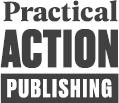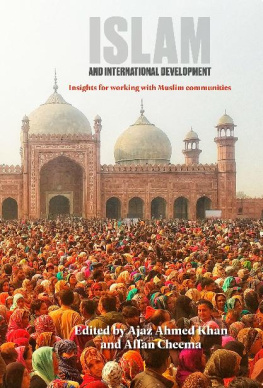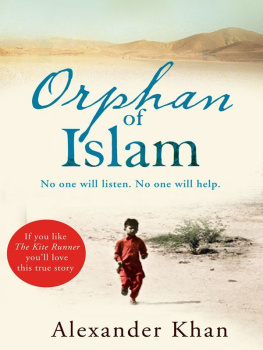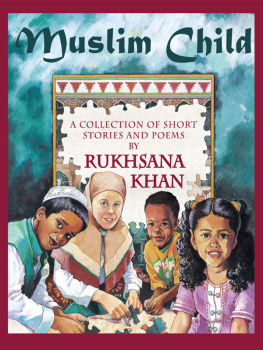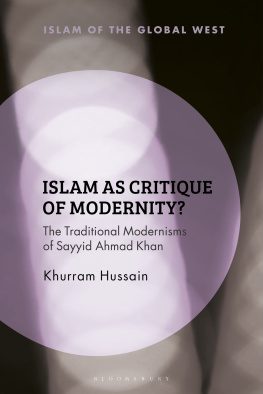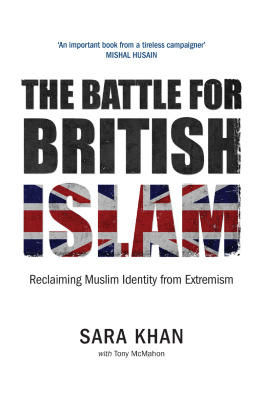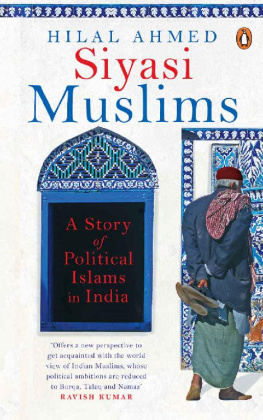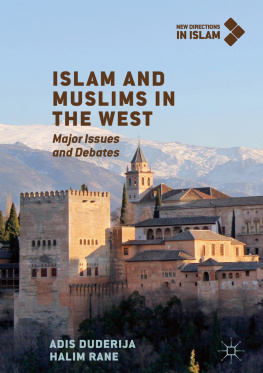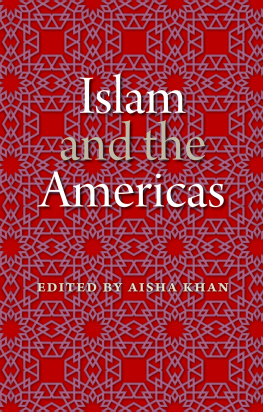Praise for this book
The research and analysis within Islam and International Development: Insights for Working with Muslim Communities offers a valuable insight in to the dynamics of the Islamic faith and development work. A great read for anyone interested or passionate about the relationship between faith and development within Muslim NGOs and INGOs.
Fadi Itani, CEO, Muslim Charities Forum (MCF)
Presenting thoughtful and often innovative theological insights as well as fascinating practical examples, this book is a must read for everybody who wants to understand the role(s) of Islam in contemporary development and humanitarian aid.
Marie Juul Petersen, The Danish Institute for Human Rights
Finally, a timely addition to the emerging realms of Religion and Development. This book enables both a detailed series of perspectives, as well as a review of a sample of actual programmes, and engagements, all unpacking the nexus between the lived realities of Muslim communities, and the business of sustainable development. A must read for international development theorists and practitioners alike.
Prof. Azza Karam, Secretary General, Religions for Peace International, and Professor of Religion and Development at the Vrije Universiteit (The Netherlands)
A remarkable effort to integrate Islamic principles into the modern development discourse.
Dr Amjad Saqib, Founder of Akhuwat, Pakistan
In a period when mainstream development and humanitarian actors in the West are taking a hard look at issues of identity, legitimacy and diversity, this book on the role of Islam in development provides a timely and fresh body of thinking and practice. The quest for locally relevant and locally led action requires outsiders to understand the world from the perspective of those they are seeking to support. The Western dominated system, much of it secular, invariably fails to recognize the importance of faith as a lens through which people view their situations and address the challenges with which they are confronted. If faith as a whole is too often overlooked, then it is safe to assume that the role of Islam is even more poorly understood. Khan and Cheema's book is a much needed analysis of why and how an understanding of Islam is essential to bringing about change in a great many contexts and on many issues where international assistance is currently concentrated.
John Plastow, Chief of Impact, Oxfam GB
Islam and International Development
Insights for working with Muslim communities
Edited by
Ajaz Ahmed Khan and Affan Cheema
Practical Action Publishing Ltd
27a Albert Street, Rugby,
Warwickshire, CV21 2SG, UK
www.practicalactionpublishing.com
Ajaz Ahmed Khan and Affan Cheema and the contributors, 2020
The moral right of the editors to be identified as editors of the work and the contributors to be identified as contributors to this work have been asserted under sections 77 and 78 of the Copyright Design and Patents Act 1988.
All rights reserved. No part of this publication may be reprinted or reproduced or utilized in any form or by any electronic, mechanical, or other means, now known or hereafter invented, including photocopying and recording, or in any information storage or retrieval system, without the written permission of the publishers.
Product or corporate names may be trademarks or registered trademarks, and are used only for identification and explanation without intent to infringe.
A catalogue record for this book is available from the British Library.
A catalogue record for this book has been requested from the Library of Congress.
ISBN 978-1-78853060-6 Paperback
ISBN 978-1-78853059-0 Hardback
ISBN 978-1-78853062-0 Epub
ISBN 978-1-78853061-3 PDF
Citation: Khan, A.A. and Cheema, A. (2020) Islam and International Development: Insights for working with Muslim communities , Practical Action Publishing, Rugby, UK .
Since 1974, Practical Action Publishing has published and disseminated books and information in support of international development work throughout the world. Practical Action Publishing is a trading name of Practical Action Publishing Ltd (Company Reg. No. 1159018), the wholly owned publishing company of Practical Action. Practical Action Publishing trades only in support of its parent charity objectives and any profits are covenanted back to Practical Action (Charity Reg. No. 247257, Group VAT Registration No. 880 9924 76).
The views and opinions in this publication are those of the editors and contributors and do not represent those of Practical Action Publishing Ltd or its parent charity Practical Action. Reasonable efforts have been made to publish reliable data and information, but the authors and publisher cannot assume responsibility for the validity of all materials or for the consequences of their use.
Cover photo: The cover photograph depicts more than 20,000 people gathering for a loan disbursement ceremony by Akhuwat Islamic Microfinance at the Badshahi Mosque in Lahore, Pakistan on 10 February 2018. Akhuwat uses mosques, and on occasions churches and temples as well, to provide training and distribute loans. In early Islamic history, as well as being places for prayer, mosques were used for administrative and community development purposes.
Courtesy of Muhammad Shakeel Ishaq.
Typeset by vPrompt eServices, India
Printed in the United Kingdom
Contents
This book is a result of the efforts of many people and they all deserve credit. Most importantly we would like to thank the authors of the individual chapters. They have done most of the work, without any renumeration, and have patiently tolerated our frequent questions and requests for further information. We are very grateful to them.
We are obliged to the various Muslim humanitarian aid and development organizations whose work is described in this book, for sharing information about their programmes and allowing us insight into their activities. We hope that they will benefit from the exposure provided through this publication.
We would like to thank CARE International and Islamic Relief Worldwide respectively for supporting us and allowing us to take the time to focus on writing this book.
Finally, we would like to thank Elise Aston for diligently reviewing the entire manuscript and her helpful comments and suggestions, Judith Forshaw for her meticulous copyediting, and Clare Tawney and Chloe Callan-Foster at Practical Action Publishing for their patience, understanding, and support in making this book possible.
Ajaz Ahmed Khan and Affan Cheema
April 2020
Ajaz Ahmed Khan is Senior Microfinance Adviser with CARE International. He holds a PhD in Development Economics and has extensive experience of working in a diverse range of countries in Latin America, Eastern Europe, Asia and Africa. He has written widely on microfinance, Islamic microfinance in particular, as well as more generally on faith and development.
Affan Cheema is the Head of Programme Quality at Islamic Relief Worldwide. He holds a MSc in Development Planning and has worked for over two decades in the humanitarian and development sector travelling extensively in Africa, Asia and the Middle East. This experience has given him a valuable insight into the poverty related needs, demands and rights of communities, especially those of a Muslim faith.
Faith is central to the lives of many people living in poverty. It provides a lens through which they view the world and a way to make sense of life's experiences. However, this reality is rarely acknowledged, invested in, or harnessed in the strategic discourse of the international development community. Instead, faith tends to be either ignored or perceived to have a negative influence, particularly in relation to Muslim communities. We feel that these views arise from a lack of understanding. Our aim in this book is to outline Islamic teachings on a range of development issues and highlight examples of positive practice. We hope that this will help practitioners, researchers, and policymakers to better understand, explore, and utilize faith as a resource that has immense potential to promote better development outcomes in Muslim communities.
